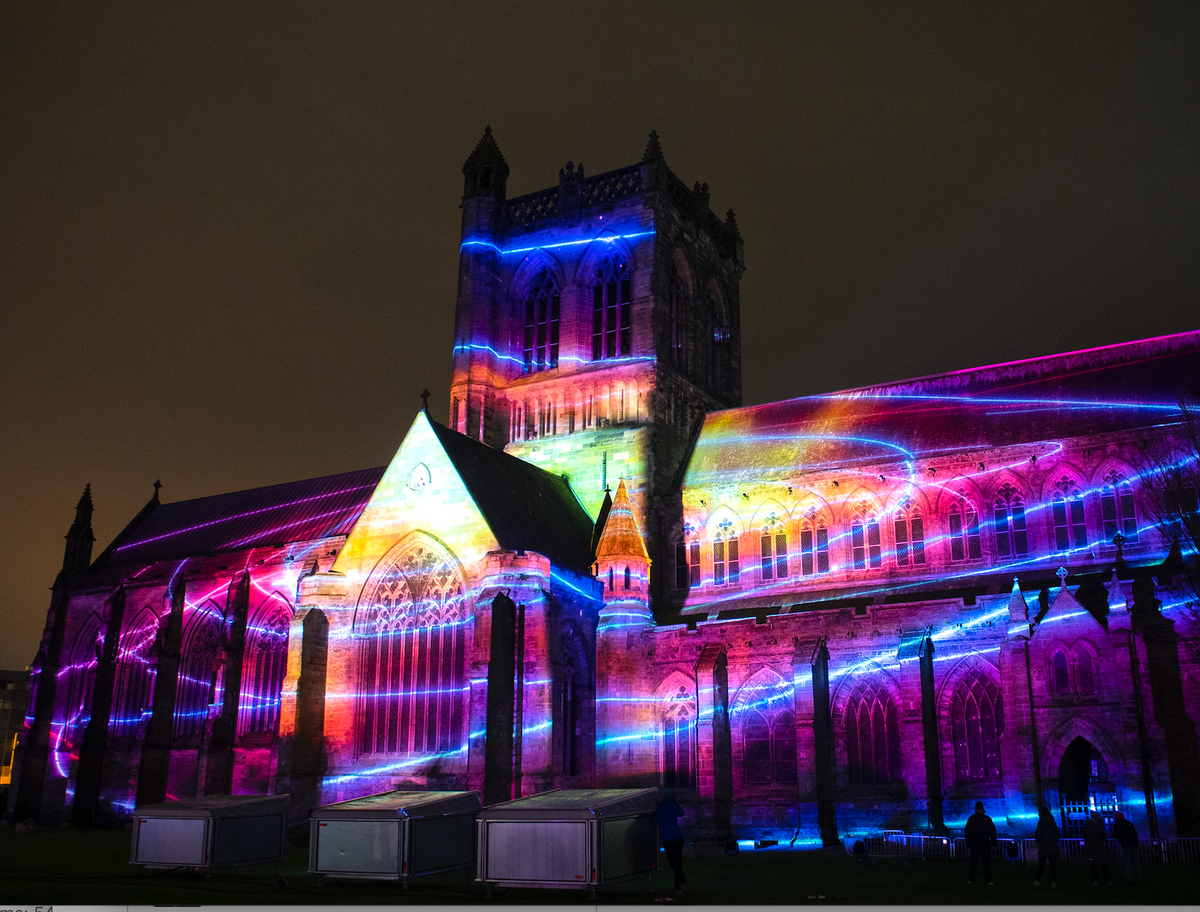The UK-wide festival known as Unboxed: Creativity in the UK, first announced by former prime minister Theresa May in 2018, has launched in Scotland with About Us, a spectacular free open-air event using the historic Paisley Abbey near Glasgow as the canvas for a dramatic immersive history projection (until 6 March).
Residents of Paisley watched the 25-minute live show exploring 13.8 billion years of history, combining poems, animations and a new original score by the musician Nitin Sawhney. The work will also be shown in Derry-Londonderry (15-21 March), Caernarfon (30 March-5 April), Luton (14-20 April) and Hull (30 April-6 May).
About Us is the first of ten "multi-site and digital creative projects" taking place across the country. The free programme of events brings together key figures in science, technology, engineering, mathematics and the arts "on TV, on radio and online", says a statement. "This was the first opportunity to treat the whole of the UK as a venue, not just the big cities," says Martin Green, the festival’s chief creative officer.
Future events include SEE MONSTER, a public art installation housed on a decommissioned North Sea oil rig to be unveiled in the coastal town of Weston-super-Mare this summer (launching 7 July). Meanwhile, the “living history” project StoryTrails, a “breathtaking deep dive into our collective histories”, will take place in 15 towns and cities culminating in a new film by the historian David Olusoga premiering at the London Film Festival in October.
When the project was first announced in 2018, it was dubbed the Festival of Brexit and met with waves of scepticism. Late 2020, applicants were invited to form Creative Teams and apply to a £3.6m-funded research and development programme for the initiative previously known as Festival*UK 2022. Thirty teams were then selected and awarded £100,000 each to originate ideas. During the last phase ten large-scale projects were commissioned, forming part of the final festival programme.
Launching a nationwide festival in the wake of a pandemic is risky but Green says that “because we had a blank sheet of paper and weren’t tied to an anniversary or a sporting event, we could go physically to as many places as possible and roll in the tech, digital and broadcast. We loved the fact we were unleashing creativity, unboxing different ideas, that it felt like a present, like a mystery.”
He adds: "The whole project was conceived pre Covid; we wanted to do [it] on broadcast, digital, live—all these different elements together so there was something secure about it even through these dark times.” Green says that Unboxed is on budget, having received £120m in government funding. "We decided early on we would not go for corporate partnerships; by sticking to that, it gives you probably the most freedom you’d ever have."
Addressing criticism that the money should be spent on supporting cash-strapped UK museums and galleries post-Covid instead, he says: "There has to be room for everything. If you use this opportunity to take this work to places where great work does not often go, doesn’t that start people’s journeys towards accessing museums, libraries, and theatres? The conservative estimate on our learning programme is [reaching] 2.5 million young people. Surely in the long term we all benefit," Green says.
Crucially, the festival is supported by the UK’s four governments. “The fact we have a Welsh, Scottish, and Northern Irish team is the product of the devolved nature of commissioning culture in the UK. When we went in with the idea, we got a universal yes from all four governments, which is magic,” Green says.
In its financial statements up to March 2021, Vikki Heywood, the chair of the festival board, writes that “the festival is delivered in partnership across the UK with funding and support from all four governments. The [festival] company is responsible for ensuring the programme is delivered at arm’s length to the agreed strategic objectives and that the content is politically neutral.”
Other Unboxed events lined up include Tour de Moon—a travelling “constellation” of performances and installations stopping in Leicester, Newcastle and Southampton (May-June)—while Galwad in Wales (September) promises to be a “new kind of multi-platform, multi-lingual story” across digital platforms and in three locations: Blaenau Ffestiniog, Merthyr Tydfil and Swansea.
SEE MONSTER in Weston-super-Mare will be a talking point nonetheless. "The ambition for SEE MONSTER is huge," says Patrick O'Mahony of NewSubstance, the Leeds-based studio behind the project. "Transforming a decommissioned North Sea platform into an art installation is a world first. It comes with many logistical challenges, to put it lightly! The project is focused around re-use, involving a number of processes to acquire, move and install the structure before the creative transformation can even begin... in fostering co-operation between sectors of art, design, engineering and the oil and gas industry, we are coming together in a moment that marks history as we mutually embrace the global energy shift towards renewables."


